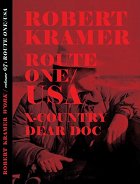Recenze (1)
In the brooding, irresistible epic Route One/USA (1989; January 8 at 7 p.m. and January 13 at 7 p.m.), Kramer and fellow expatriate Doc (Paul McIsaac) join in a trek from the beginning of Route 1 in Maine to its end in Florida. The journey is a doomed search for identity and wholeness. Doc enters, fleetingly, a succession of private worlds, each of which reveals itself to the camera, sometimes in a canned, practiced way suggesting that cameras have been here before (a self-aggrandizing community leader in Bridgeport, Connecticut; a barker in front of the Tragedy in U.S. History Museum in St. Augustine, Florida), sometimes in a capsule of time that is hard, unfamiliar, and complete (an aged Indian woman in Maine going back over her life). "Everything's different and nothing has changed," Doc observes near the beginning of the journey, after observing a spectral anti-abortion picket line in New Hampshire. "The same civil wars are still being fought." Route One/USA has a great density of themes. Running throughout is the idea of rebellion: rebellion of the colonists against Britain, of the South against the North, of child against parent. Constantly, the themes of parents and children, of history, legacies, memory, are linked to the cinema and to photography. The title of the army-recruitment promo tape that an officer proudly displays for Kramer's camera is "Dear Dad." Earlier, two teenage newlyweds are asked: "What were you thinking of when the photographer was taking your picture?" The groom answers, "I was thinking of our kids in the future, how I would show them what their mom was like, to give them pride." The film's complexity of viewpoint, rhythm, and pace matches the complexity of its personal and social narratives. The figure of Doc -- a skeptical observer prowling nervously around the periphery of scenes -- casts melancholy and doubt over the film but never dominates it entirely. Kramer washes us in things, conversations, information; he gives us events staged, reflected on, and isolated in time as if they were part of a dramatic narrative film: the bride and groom rehearsing their wedding vows, or Doc's abrupt decision, in a barber's chair, to abandon the journey -- a decision that results in a radical freeing of the film's style and mood. Much of the last stage of the film is a lyric poem about the Miami waterfront: bird cries and sounds of creaking and humming form a concrete symphony. The gliding images make explicit the longing for distance, for transcendence, that one feels throughout Kramer's film --- Chris Fujiwara ()
